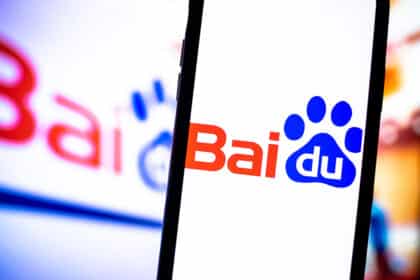Baidu Secures Permit to Become First Fully Driverless Taxi Service Provider in Beijing
With the Beijing development, Baidu can now operate a driverless taxi service in three Chinese cities, including Wuhan and Chongqing.
Chinese tech giant Baidu has secured the right to offer the first fully driverless taxi service in China’s capital, Beijing. On Friday, the Beijing-based company made the announcement, which also included part of its logistical rollout. Baidu said its Apollo Go service would deploy 10 fully driverless cars in a technology park developed by Beijing’s government.
Apollo Go currently has vehicles operating over 20 rides per day in the Yizhuang Economic Development Zone. The Yizhuang Economic Development Zone is one of China’s autonomous driving cradles.
In last year’s fourth quarter, Apollo Go completed 561,000 rides, representing a 162% increase year-over-year (YoY). Furthermore, the platform’s cumulative number of rides carried out surpassed two million at the end of January. This development makes Baidu the largest autonomous ride-hailing service provider in the world. This year, the Chinese tech powerhouse also seeks to establish the world’s largest fully driverless ride-hailing area.
The Baidu driverless taxi permit in Beijing marks a significant step forward from last December. At the time, Baidu received a permit to test the service as the company sought to diversify beyond its bread-and-butter internet search engine service. The Chinese multinational tech company has focused on autonomous driving technologies over the last five years.
Expanded Baidu Wuhan Driverless Taxi Operability
In late December, Baidu began offering autonomous nighttime taxis in the Chinese city of Wuhan. The scheme was a step up from the daytime operations the company previously operated in the city. Baidu explained that the autonomous service, which ran from 7 am to 11 pm, would cover around one million customers.
In a previous statement, Baidu also touched on its autonomous vehicle visual-language model for identifying unseen objects in long-tail scenarios. According to the tech giant, “the model will enable autonomous vehicles to quickly make sense of an unseen object, such as special vehicle (fire truck, ambulance) recognition, plastic bag misdetection, and others. In addition, Baidu’s autonomous driving perception model – a sub-model of the WenXin Big Model – leveraging more than 1 billion parameters, is able to dramatically improve the generalization potential of autonomous driving perception.”
As it stands, Baidu will operate driverless robotaxi services in three Chinese cities – Beijing, Wuhan, and Chongqing.
ChatGPT Rival
In other recent Baidu news, the company’s shares dropped 6% after its CEO, Robin Li, unveiled an AI chatbot rivaling ChatGPT. Most of the negative reaction was channeled at the ‘pre-recorded’ presentation format of the unveiling.
Li touted the benefits of the Chinese-language ChatGPT initiative. According to him, “its extremely strong ability to comprehend and express language will allow any company to get closer to their customers. It’s an opportunity for every company, and it will even have an impact on every single person.”
Despite admitting some inherent errors in the tech’s current functionality, the Baidu CEO noted the AI bot is “advancing very fast.”
next
Tolu is a cryptocurrency and blockchain enthusiast based in Lagos. He likes to demystify crypto stories to the bare basics so that anyone anywhere can understand without too much background knowledge.
When he’s not neck-deep in crypto stories, Tolu enjoys music, loves to sing and is an avid movie lover.
Credit: Source link


 Bitcoin
Bitcoin  Ethereum
Ethereum  Tether
Tether  Solana
Solana  USDC
USDC  Lido Staked Ether
Lido Staked Ether  XRP
XRP  Dogecoin
Dogecoin  Toncoin
Toncoin  Cardano
Cardano  Shiba Inu
Shiba Inu  Avalanche
Avalanche  Wrapped Bitcoin
Wrapped Bitcoin  TRON
TRON  Bitcoin Cash
Bitcoin Cash  Polkadot
Polkadot  Chainlink
Chainlink  Polygon
Polygon  Litecoin
Litecoin  NEAR Protocol
NEAR Protocol  Internet Computer
Internet Computer  LEO Token
LEO Token  Uniswap
Uniswap  Dai
Dai  First Digital USD
First Digital USD  Aptos
Aptos  Ethereum Classic
Ethereum Classic  Mantle
Mantle  Stacks
Stacks  OKB
OKB  Cronos
Cronos  Filecoin
Filecoin  Cosmos Hub
Cosmos Hub  Bittensor
Bittensor  Stellar
Stellar  Render
Render  Arbitrum
Arbitrum  Maker
Maker  Hedera
Hedera  Immutable
Immutable  dogwifhat
dogwifhat  The Graph
The Graph  Ethena USDe
Ethena USDe  Optimism
Optimism  Pepe
Pepe  Injective
Injective  Wrapped eETH
Wrapped eETH
Comments are closed.